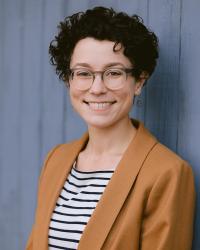
Biography
Annie Dwyer (she/her) is a lecturer in the Comparative History of Ideas, where she is one of the lead instructors of the senior capstone course. From 2017-2021, Annie was also the Assistant Program Director of a Mellon-funded initiative at the University of Washington’s Simpson Center for the Humanities, Reimagining the Humanities PhD and Reaching New Publics, which focused on fostering publicly engaged scholarship and teaching in graduate education. Annie earned her PhD in English Literature and Culture from the University of Washington in 2014. Her scholarship in critical animal studies and the environmental humanities explores the intersections of gender, race, sexuality, and species across social formations and cultural forms. She is currently working on a book project that follows shifting articulations of ecological grief in the American context from the early conservation movement through the rise of youth-led climate activism provisionally titled Losing Nature: American Literature and Ecological Grief. Annie is also a mental health counselor with a particular interest in climate psychology.
Courses Taught
Autumn 2025
Summer 2025
Spring 2025
Winter 2025
Autumn 2024
Winter 2024
Autumn 2023
Summer 2023
Spring 2023
Autumn 2022
Spring 2022
Winter 2022
Autumn 2021
Summer 2021
Spring 2021
Winter 2021
Autumn 2020
Summer 2020
Spring 2020
Winter 2020
Autumn 2019
Summer 2019
Spring 2019
Winter 2019
CHID Thesis Advising Areas
I am especially excited to advise CHID senior projects that engage with the questions and concerns of the environmental humanities, critical animal studies, literary and cultural studies, and feminist and queer studies. As a trained clinician, I am also well-poised to support projects grappling in some way with affect, mental health, and so forth—though I bring an interdisciplinary, critical lens to such topics. Given my background supporting public scholarship at the Simpson Center, I am particularly well-poised to support public-facing projects, but my experience teaching composition also informs my belief that the “traditional” academic paper, too, can and should be an exciting creative endeavor!